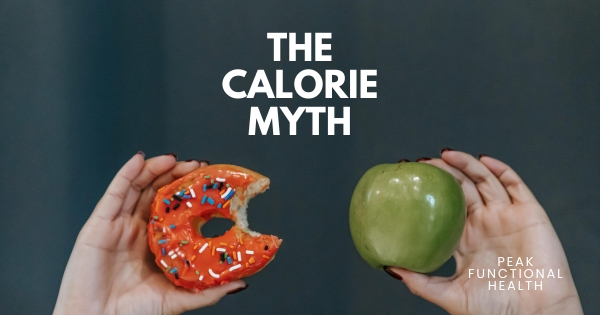The Impartial Truth of Calories

Much more complex than math.
It’s easy to see why the theory of calories in, calories out has been embedded in nutrition and exercise advice for years. Seemingly, the logic is clean, reliable, and mathematically sound. Basically, just eat fewer calories than you burn, and you’ll lose weight.
On paper, it works something like this:
To lose one pound of body weight per week (a rate often considered “safe”), you’d need a weekly deficit of about 3,500 calories. Spread that out over seven days, and you’d aim for 500 fewer calories per day. In theory, sticking to this plan all year could mean losing 52 pounds by New Year’s Eve. Want to go faster? Just double the deficit by exercising more while eating fewer calories.
If only our bodies were as predictable.
The model treats all calories as equal, as though 100 calories of birthday cake have the same impact on the body as 100 calories of spinach. If that were true, the only thing that would matter is staying under a calorie limit, with no regard for food quality. This thinking can lead to diets built around inflammatory foods engineered to be low-calorie but nutrient-poor, replacing essential fats and proteins with highly processed sugars, additives, and oxidative fats that offer few benefits.
Why Calories Aren’t Just Calories
While we can measure the caloric value of food in a lab, the body is not a beaker where calories go in and out according to a fixed formula. It’s more like a black box influenced by hormones, gut bacteria, stress, sleep, and the types of foods you eat…that intersection where food meets physiology.
In the body, different macronutrients are processed differently. Protein, for example, costs more energy to digest and absorb than carbohydrates or fats, giving it a higher “thermic effect.” Fiber slows digestion, supports gut health, and stabilizes blood sugar. Healthy fats may contain 9 calories per gram (more than double that of protein or carbohydrates) but have a powerful ability to promote fullness and sustain energy. This is why 200 calories from almonds, with protein, healthy fats, and fiber, affect your body very differently than 200 calories from soda, which is rapidly absorbed and spikes insulin.
Even if every food label were perfectly accurate (spoiler: they’re not), not all the calories you eat are absorbed. Gut health plays a major role in how efficiently you extract calories from food. Fiber-rich foods may allow some calories to pass through unused. Beyond digestion, the hormonal response to certain foods determines whether energy is stored or burned, a topic we’ve explored in previous articles on blood glucose and insulin.
When the Math Stops Working
If calorie math worked indefinitely, you could theoretically keep cutting calories until you hit zero, but biology doesn’t work that way. Your body adapts to what it perceives as famine.
Chronic calorie reduction lowers your resting metabolic rate, so you burn fewer calories at rest. Thyroid hormone output decreases, which can stall or even reverse weight loss. Hunger hormones like ghrelin rise, making food more tempting and restraint more difficult. At this point, it’s no longer just about willpower; you’re up against deeply ingrained biological survival mechanisms.
This adaptation is one reason Biggest Loser contestants often regained much of their lost weight. Years later, many still had suppressed resting metabolic rates despite eating less and exercising more than before.
For the mathematically minded, here’s the twist: often, eating more calories from nutrient-dense, whole foods results in better health and weight outcomes than eating fewer calories from highly processed foods. Whole foods are more satiating, improve blood sugar regulation, and reduce inflammation, all factors that influence whether your body stores fat or burns it.
Calorie counting can work for some people, and if it works for you, that’s great (especially if you do it by choosing nutrient dense foods and not as a justification to eat deficient foods).
But from a functional nutrition standpoint, health and weight management are less about rigid calorie tracking and more about the quality, quantity, diversity, and timing of what you eat to support long-term goals. Calorie restriction, when prolonged, can also lead to nutrient deficiencies, faster mobilization of stored toxins than the body can safely eliminate, and digestive imbalances that make long-term weight regulation harder.
Counting calories might bring short-term results, but long-term success is rarely about the math alone. Your body is an adaptive, living system that responds to food quality, hormonal signals, and lifestyle habits. Sustainable health and weight are better supported by nourishing your body with nutrient-rich foods, eating mindfully, and addressing the factors that influence metabolism from the inside out, rather than starving it into submission.
If you're interested in specific strategies that better support lifelong health, download my free guide Where Food Meets Physiology for practical strategies anyone can start implementing today for better health outcomes.